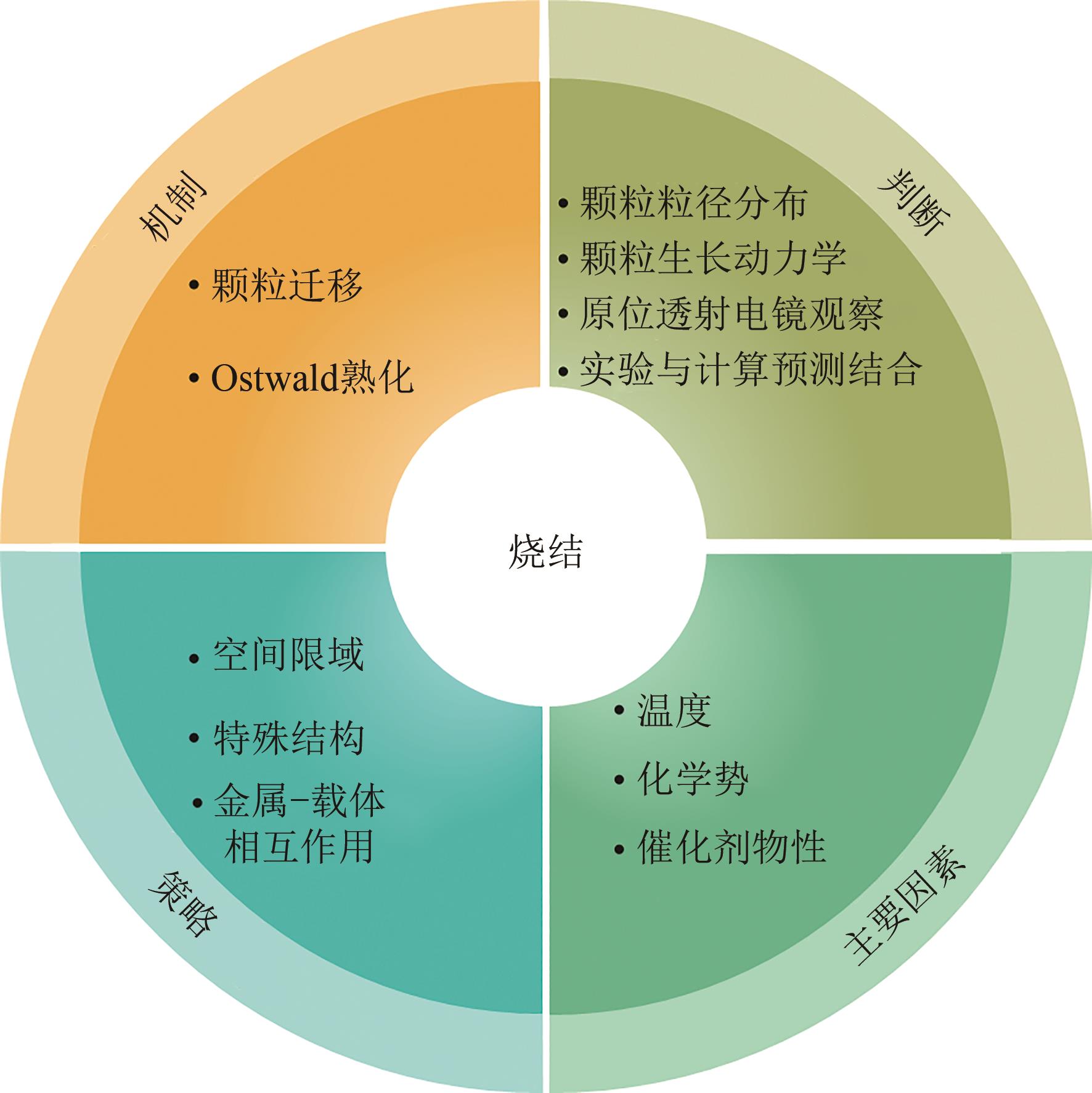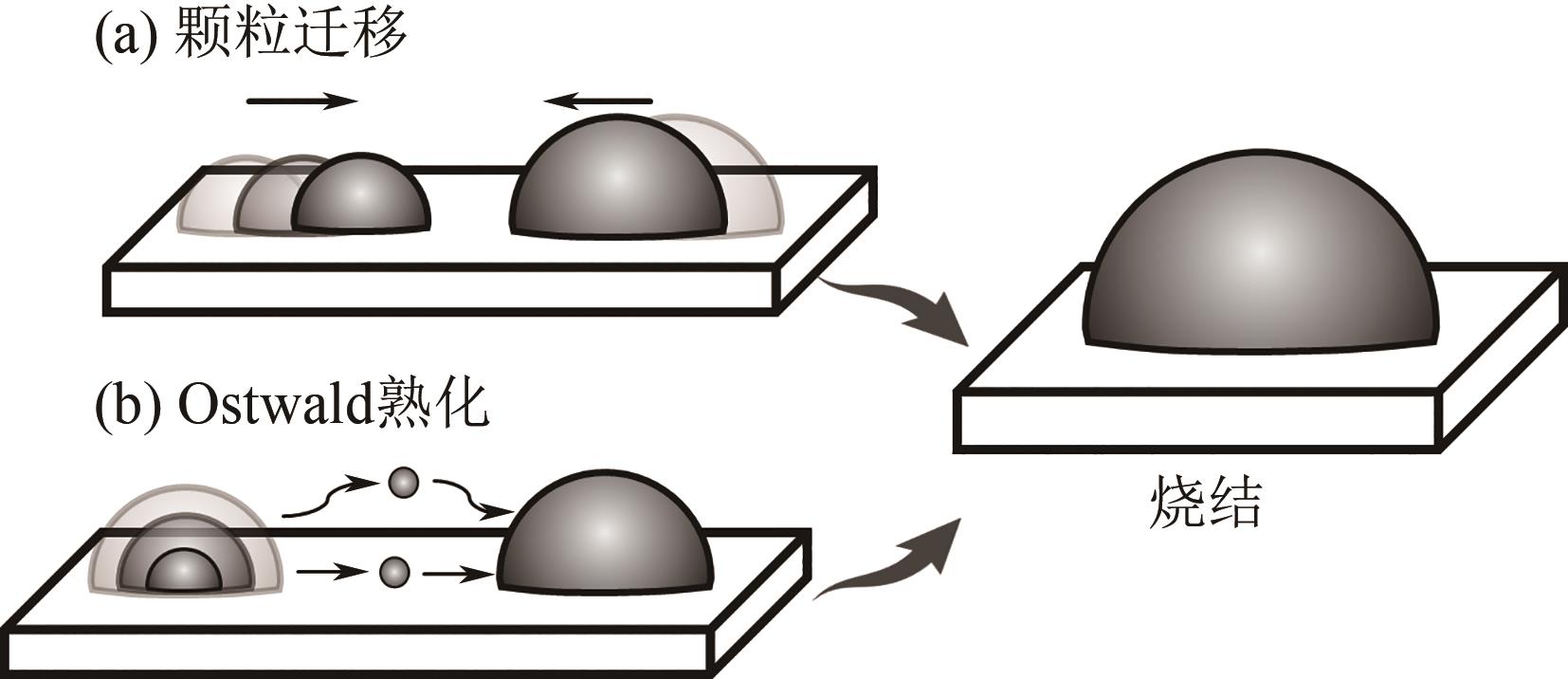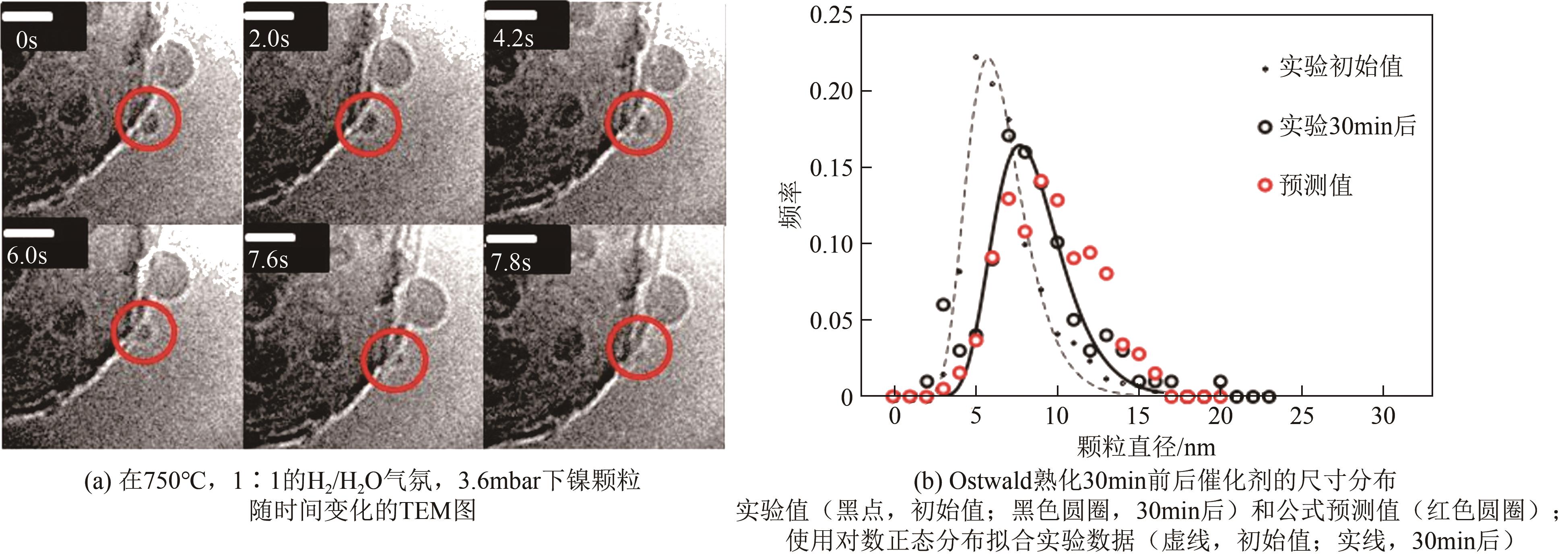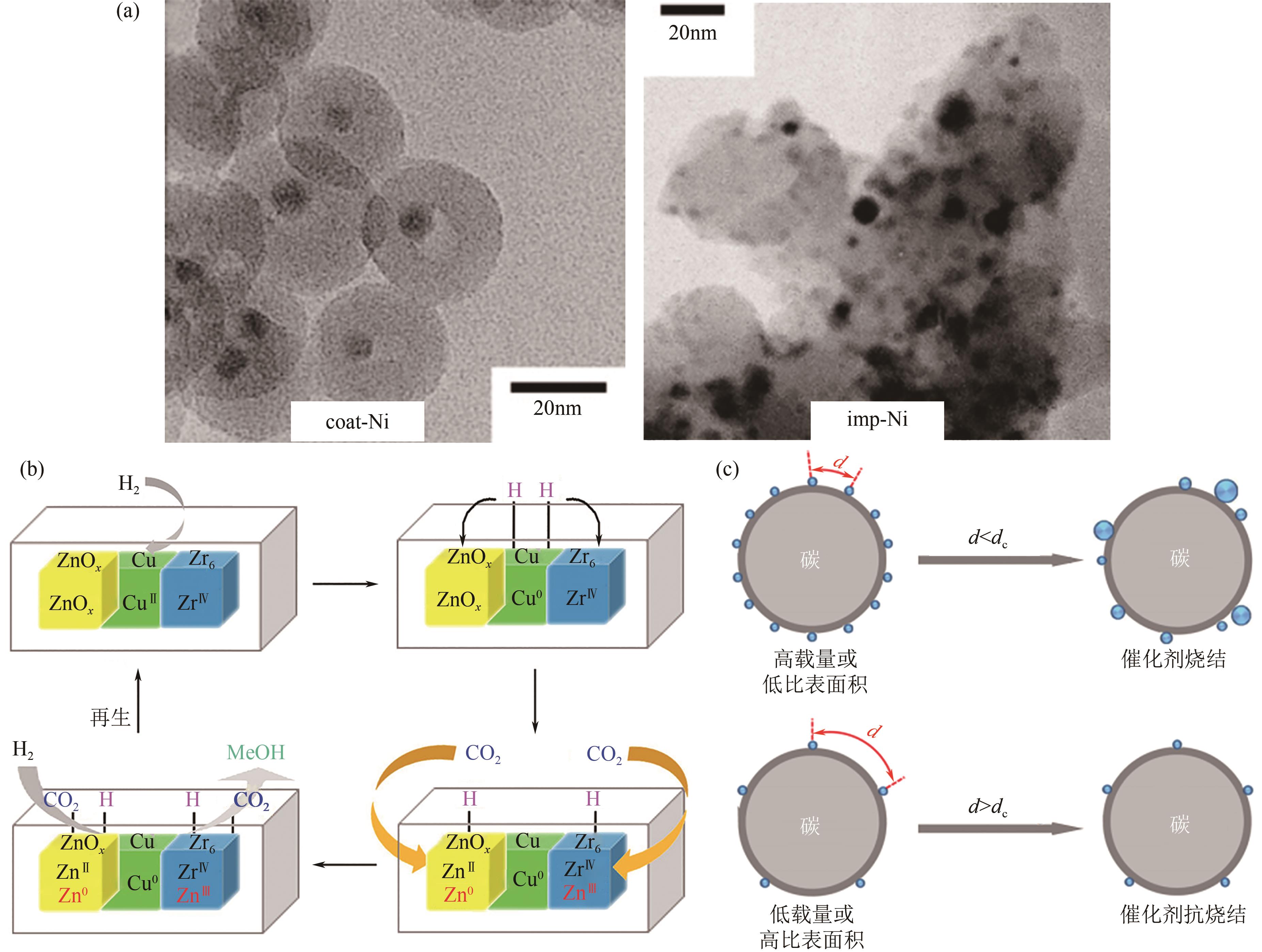Chemical Industry and Engineering Progress ›› 2023, Vol. 42 ›› Issue (2): 744-755.DOI: 10.16085/j.issn.1000-6613.2022-0688
• Industrial catalysis • Previous Articles Next Articles
Sintering mechanism and sintering-resistant strategies for metal-based catalyst
CAO Min( ), MAO Yujiao, WANG Qianqian, LI Sha, YAN Xiaoliang(
), MAO Yujiao, WANG Qianqian, LI Sha, YAN Xiaoliang( )
)
- College of Chemical Engineering and Technology, Taiyuan University of Technology, Taiyuan 030024, Shanxi, China
-
Received:2022-04-18Revised:2022-08-02Online:2023-03-13Published:2023-02-25 -
Contact:YAN Xiaoliang
金属催化剂烧结机制及抗烧结策略
- 太原理工大学化学工程与技术学院,山西 太原 030024
-
通讯作者:闫晓亮 -
作者简介:曹敏(1999—),女,硕士研究生,研究方向为镍基催化剂的设计及干重整性能。E-mail:2206151810@qq.com。 -
基金资助:国家自然科学基金(22108189);山西浙大新材料与化工研究院项目(2021SX-TD005);山西省高等学校中青年拔尖创新人才
CLC Number:
Cite this article
CAO Min, MAO Yujiao, WANG Qianqian, LI Sha, YAN Xiaoliang. Sintering mechanism and sintering-resistant strategies for metal-based catalyst[J]. Chemical Industry and Engineering Progress, 2023, 42(2): 744-755.
曹敏, 毛玉娇, 王倩倩, 李莎, 闫晓亮. 金属催化剂烧结机制及抗烧结策略[J]. 化工进展, 2023, 42(2): 744-755.
share this article
Add to citation manager EndNote|Ris|BibTeX
URL: https://hgjz.cip.com.cn/EN/10.16085/j.issn.1000-6613.2022-0688
| 1 | YIN Hao, ZHENG Liqing, FANG Wei, et al. Nanometre-scale spectroscopic visualization of catalytic sites during a hydrogenation reaction on a Pd/Au bimetallic catalyst[J]. Nature Catalysis, 2020, 3(10): 834-842. |
| 2 | 姜健准, 刘红梅, 张明森. Ni/ZrO2催化剂的制备及甲烷分步水蒸气重整反应性能[J]. 化工进展, 2018, 37(1): 112-118. |
| JIANG Jianzhun, LIU Hongmei, ZHANG Mingsen. Preparation of Ni/ZrO2 catalyst and its performance in the reaction of stepwise steam reforming of methane[J]. Chemical Industry and Engineering Progress, 2018, 37(1): 112-118. | |
| 3 | CHAI Mengqian, LIU Xiaoyan, LI Lin, et al. SiO2-supported Au-Ni bimetallic catalyst for the selective hydrogenation of acetylene[J]. Chinese Journal of Catalysis, 2017, 38(8): 1338-1346. |
| 4 | 王凯琪, ZEESHAN Muhammad, 韩金明, 等. Pt-Ga和Ga-Mo双金属催化剂的丙烷脱氢反应性能研究[J]. 天然气化工(C1化学与化工), 2020, 45(2): 5-10. |
| WANG Kaiqi, ZEESHAN M, HAN Jinming, et al. Catalytic performance of Pt-Ga and Ga-Mo bimetallic catalysts in propane dehydrogenation[J]. Natural Gas Chemical Industry, 2020, 45(2): 5-10. | |
| 5 | CAO Minna, WU Dongshuang, CAO Rong. Recent advances in the stabilization of platinum electrocatalysts for fuel-cell reactions[J]. ChemCatChem, 2014, 6(1): 26-45. |
| 6 | LI Li, HU Linping, LI Jin, et al. Enhanced stability of Pt nanoparticle electrocatalysts for fuel cells[J]. Nano Research, 2015, 8(2): 418-440. |
| 7 | DAI Yunqian, LU Ping, CAO Zhenming, et al. The physical chemistry and materials science behind sinter-resistant catalysts[J]. Chemical Society Reviews, 2018, 47(12): 4314-4331. |
| 8 | SEHESTED J, LARSEN N W, FALSIG H, et al. Sintering of nickel steam reforming catalysts: Effective mass diffusion constant for Ni-OH at nickel surfaces[J]. Catalysis Today, 2014, 228: 22-31. |
| 9 | BENSVIDEZ A D, KOVARIK L, GENC A, et al. Environmental transmission electron microscopy study of the origins of anomalous particle size distributions in supported metal catalysts[J]. ACS Catalysis, 2012, 2(11): 2349-2356. |
| 10 | YUAN Wentao, ZHANG Dawei, Yang OU, et al. Direct in situ TEM visualization and insight into the facet-dependent sintering behaviors of gold on TiO2 [J]. Angewandte Chemie International Edition, 2018, 57(51): 16827-16831. |
| 11 | HU Sulei, LI Weixue. Sabatier principle of metal-support interaction for design of ultrastable metal nanocatalysts[J]. Science, 2021, 374(6573): 1360-1365. |
| 12 | YIN Peng, HU Sulei, QIAN Kun, et al. Quantification of critical particle distance for mitigating catalyst sintering[J]. Nature Communications, 2021, 12: 4865. |
| 13 | GRANQVIST C G, BUHRMAN R A. Statistical model for coalescence of islands in discontinuous films[J]. Applied Physics Letters, 1975, 27(12): 693-694. |
| 14 | WYNBLATT P, GJOSTEIN N A. Supported metal crystallites[J]. Progress in Solid State Chemistry, 1975, 9: 21-58. |
| 15 | CHALLA S R, DELARIVA A T, HANSEN T W, et al. Relating rates of catalyst sintering to the disappearance of individual nanoparticles during Ostwald ripening[J]. Journal of the American Chemical Society, 2011, 133(51): 20672-20675. |
| 16 | CAMPBLL C T, MAO Zhongtian. Chemical potential of metal atoms in supported nanoparticles: Dependence upon particle size and support[J]. ACS Catalysis, 2017, 7(12): 8460-8466. |
| 17 | PARKER S C, CAMPBELL C T. Kinetic model for sintering of supported metal particles with improved size-dependent energetics and applications to Au on TiO2(110)[J]. Physical Review B, 2007, 75(3): 035430. |
| 18 | LOOF P, STENBOM B, NORDEN H, et al. Rapid sintering in NO of nanometer-sized Pt particles on γ-Al2O3 observed by CO temperature-programmed desorption and transmission electron microscopy[J]. Journal of Catalysis, 1993, 144(1): 60-76. |
| 19 | LI Guanxing, FANG Ke, CHEN Yuzhuo, et al. Unveiling the gas-dependent sintering behavior of Au-TiO2 catalysts via environmental transmission electron microscopy[J]. Journal of Catalysis, 2020, 388: 84-90. |
| 20 | HE Zhanfeng, JIAO Yi, WANG Jianli, et al. Effects of M (Zr, Nb, Y) modifiers on the catalytic performance of Ni/Ce-Al2O3 bimetallic catalyst in steam reforming of n-decane[J]. Journal of Analytical and Applied Pyrolysis, 2016, 122: 142-150. |
| 21 | 马占华, 李帅, 姜爱晶, 等. 锡负载量对PtSn/Al2O3催化丙烷脱氢性能的影响[J]. 高等学校化学学报, 2019, 40(2): 326-333. |
| MA Zhanhua, LI Shuai, JIANG Aijing, et al. Effects of Sn loading on catalytic performance of PtSn/Al2O3 in propane dehydrogenation[J]. Chemical Journal of Chinese Universities, 2019, 40(2): 326-333. | |
| 22 | PAN Can, GUO Zhanglong, DAI Hui, et al. Anti-sintering mesoporous Ni-Pd bimetallic catalysts for hydrogen production via dry reforming of methane[J]. International Journal of Hydrogen Energy, 2020, 45(32): 16133-16143. |
| 23 | SONG Boao, YANG T T, YUAN Yifei, et al. Revealing sintering kinetics of MoS2-supported metal nanocatalysts in atmospheric gas environments via operando transmission electron microscopy[J]. ACS Nano, 2020, 14(4): 4074-4086. |
| 24 | TANG Honggui, LI Shuangshuang, GONG Dandan, et al. Bimetallic Ni-Fe catalysts derived from layered double hydroxides for CO methanation from syngas[J]. Frontiers of Chemical Science and Engineering, 2017, 11(4): 613-623. |
| 25 | 秦绍东, 龙俊英, 田大勇, 等. 不同载体负载的Mo基甲烷化催化剂[J]. 工业催化, 2014, 22(10): 770-774. |
| QIN Shaodong, LONG Junying, TIAN Dayong, et al. Supported Mo-based catalysts with different carriers for methanation[J]. Industrial Catalysis, 2014, 22(10): 770-774. | |
| 26 | GAO Yanan, CHIANG Fukuo, LI Shaojie, et al. Influence of hematite morphology on the CO oxidation performance of Au/α-Fe2O3 [J]. Chinese Journal of Catalysis, 2021, 42(4): 658-665. |
| 27 | TAUSTER S J, FUNG S C, GARTEN R L. Strong metal-support interactions. Group 8 noble metals supported on titanium dioxide[J]. Journal of the American Chemical Society, 1978, 100(1): 170-175. |
| 28 | BECK A, HUANG Xing, ARTIGLIA L, et al. The dynamics of overlayer formation on catalyst nanoparticles and strong metal-support interaction[J]. Nature Communications, 2020, 11: 3220. |
| 29 | CABALLERO A, HOLGADO J P, GONZALEZ-DELACRUZ V M, et al. In situ spectroscopic detection of SMSI effect in a Ni/CeO2 system: Hydrogen-induced burial and dig out of metallic nickel[J]. Chemical Communications (Cambridge, England), 2010, 46(7): 1097-1099. |
| 30 | NAUMANN D’ALNONCOURT R, FRIEDRICH M, KUNKES E, et al. Strong metal-support interactions between palladium and iron oxide and their effect on CO oxidation[J]. Journal of Catalysis, 2014, 317: 220-228. |
| 31 | Qin Z H, LEWANDOWSKI M, SUN Y N, et al. Encapsulation of Pt nanoparticles as a result of strong metal-support interaction with Fe3O4 (111)[J]. The Journal of Physical Chemistry C, 2008, 112: 10209-10213. |
| 32 | XU Ming, HE Shan, CHEN Hao, et al. TiO2- x -modified Ni nanocatalyst with tunable metal-support interaction for water-gas shift reaction[J]. ACS Catalysis, 2017, 7(11): 7600-7609. |
| 33 | LIU Xiaoyan, LIU Minghan, LUO Y C, et al. Strong metal-support interactions between gold nanoparticles and ZnO nanorods in CO oxidation[J]. Journal of the American Chemical Society, 2012, 134(24): 10251-10258. |
| 34 | WANG Weixing, LI Xuekuan, ZHANG Ye, et al. Strong metal-support interactions between Ni and ZnO particles and their effect on the methanation performance of Ni/ZnO[J]. Catalysis Science & Technology, 2017, 7(19): 4413-4421. |
| 35 | TANG Hailian, LIU Fei, WEI Jiake, et al. Ultrastable hydroxyapatite/titanium-dioxide-supported gold nanocatalyst with strong metal-support interaction for carbon monoxide oxidation[J]. Angewandte Chemie Internatonal Edition, 2016, 128(36): 10764-10769. |
| 36 | WANG Hai, WANG Liang, LIN Dong, et al. Strong metal-support interactions on gold nanoparticle catalysts achieved through Le Chatelier’s principle[J]. Nature Catalysis, 2021, 4(5): 418-424. |
| 37 | DONG Jinhu, FU Qiang, LI Haobo, et al. Reaction-induced strong metal-support interactions between metals and inert boron nitride nanosheets[J]. Journal of the American Chemical Society, 2020, 142(40): 17167-17174. |
| 38 | WANG Yaoxin, WANG Jiandian, ZHENG Ping, et al. Boosting selectivity and stability on Pt/BN catalysts for propane dehydrogenation via calcination & reduction-mediated strong metal-support interaction[J]. Journal of Energy Chemistry, 2022, 67: 451-457. |
| 39 | WEI Yichen, CAI Weijie, DENG Shiji, et al. Efficient syngas production via dry reforming of renewable ethanol over Ni/KIT-6 nanocatalysts[J]. Renewable Energy, 2020, 145: 1507-1516. |
| 40 | SONG Qi, ALTAF N, ZHU Mingyuan, et al. Enhanced low-temperature catalytic carbon monoxide methanation performance via vermiculite-derived silicon carbide supported nickel nanoparticles[J]. Sustainable Energy & Fuels, 2019, 3(4): 965-974. |
| 41 | ZHANG Liyun, LIU Hongyang, HUANG Xing, et al. Stabilization of palladium nanoparticles on nanodiamond-graphene core-shell supports for CO oxidation[J]. Angewandte Chemie International Edition, 2015, 54(52): 15823-15826. |
| 42 | HOU Zhaoyin, YOKOTA O, TANAKA T, et al. Characterization of Ca-promoted Ni/α-Al2O3 catalyst for CH4 reforming with CO2 [J]. Applied Catalysis A: General, 2003, 253(2): 381-387. |
| 43 | MARGOSSIAN T, LARMIER K, KIM S M, et al. Molecularly tailored nickel precursor and support yield a stable methane dry reforming catalyst with superior metal utilization[J]. Journal of the American Chemical Society, 2017, 139(20): 6919-6927. |
| 44 | WANG Qing, SUN Weizhong, JIN Guoqiang, et al. Biomorphic SiC pellets as catalyst support for partial oxidation of methane to syngas[J]. Applied Catalysis B: Environmental, 2008, 79(4): 307-312. |
| 45 | WU Zongfang, LI Yangyang, HUANG Weixin. Size-dependent Pt-TiO2 strong metal-support interaction[J]. The Journal of Physical Chemistry Letters, 2020, 11(12): 4603-4607. |
| 46 | ZHANG Yunshang, LIU Jinxun, QIAN Kun, et al. Structure sensitivity of Au-TiO2 strong metal-support interactions[J]. Angewandte Chemie International Edition, 2021, 60(21): 12074-12081. |
| 47 | PARASTAEV A, MURAVEV V, HUERTAS OSTA E, et al. Boosting CO2 hydrogenation via size-dependent metal-support interactions in cobalt/ceria-based catalysts[J]. Nature Catalysis, 2020, 3(6): 526-533. |
| 48 | LIU Zhicheng, ZHOU Jian, CAO Kun, et al. Highly dispersed nickel loaded on mesoporous silica: One-spot synthesis strategy and high performance as catalysts for methane reforming with carbon dioxide[J]. Applied catalysis B: Environmental, 2012, 125: 324-330. |
| 49 | ABDEL KARIM ARAMOUNI N, ZEAITER J, KWAPINSKI W, et al. Thermodynamic analysis of methane dry reforming: Effect of the catalyst particle size on carbon formation[J]. Energy Conversion and Management, 2017, 150: 614-622. |
| 50 | MOLINER M, GABAY J E, KLIEWER C E, et al. Reversible transformation of Pt nanoparticles into single atoms inside high-silica chabazite zeolite[J]. Journal of the American Chemical Society, 2016, 138(48): 15743-15750. |
| 51 | WEI Shengjie, LI Ang, LIU Jincheng, et al. Direct observation of noble metal nanoparticles transforming to thermally stable single atoms[J]. Nature Nanotechnology, 2018, 13(9): 856-861. |
| 52 | KARTUSCH C, KRUMEICH F, SAFONOVA O, et al. Redispersion of gold multiple-twinned particles during liquid-phase hydrogenation[J]. ACS Catalysis, 2012, 2(7): 1394-1403. |
| 53 | LIN Lili, LIU Jinjia, LIU Xi, et al. Reversing sintering effect of Ni particles on γ-Mo2N via strong metal support interaction[J]. Nature Communications, 2021, 12: 6978. |
| 54 | QIAO Botao, WANG Aiqin, YANG Xiaofeng, et al. Single-atom catalysis of CO oxidation using Pt1/FeO x [J]. Nature Chemistry, 2011, 3(8): 634-641. |
| 55 | JIANG Rui, LI Li, SHENG Tian, et al. Edge-site engineering of atomically dispersed Fe-N4 by selective C-N bond cleavage for enhanced oxygen reduction reaction activities[J]. Journal of the American Chemical Society, 2018, 140(37): 11594-11598. |
| 56 | YANG Xiaofeng, WANG Aiqin, QIAO Botao, et al. Single-atom catalysts: A new frontier in heterogeneous catalysis[J]. Accounts of Chemical Research, 2013, 46(8): 1740-1748. |
| 57 | VAJDA S, WHITE M G. Catalysis applications of size-selected cluster deposition[J]. ACS Catalysis, 2015, 5(12): 7152-7176. |
| 58 | BORONAT M, LEYVA-PÉREZ A CORMA A. Theoretical and experimental insights into the origin of the catalytic activity of subnanometric gold clusters: Attempts to predict reactivity with clusters and nanoparticles of gold[J]. Accounts of Chemical Research, 2014, 47(3): 834-844. |
| 59 | QIAO Botao, LIANG Jinxia, WANG Aiqin, et al. Ultrastable single-atom gold catalysts with strong covalent metal-support interaction (CMSI)[J]. Nano Research, 2015, 8(9): 2913-2924. |
| 60 | LANG Rui, XI Wei, LIU Jincheng, et al. Non defect-stabilized thermally stable single-atom catalyst[J]. Nature Communications, 2019, 10: 234. |
| 61 | XIE Pengfei, PU Tiancheng, NIE Anmin, et al. Nanoceria-supported single-atom platinum catalysts for direct methane conversion[J]. ACS Catalysis, 2018, 8(5): 4044-4048. |
| 62 | AKRI M, ZHAO Shu, LI Xiaoyu, et al. Atomically dispersed nickel as coke-resistant active sites for methane dry reforming[J]. Nature Communications, 2019, 10: 5181. |
| 63 | OUYANG C Y, SLJIVANCANIN Z, BALDERESCHI A. Transition from Mn4+ to Mn3+ induced by surface reconstruction at λ-MnO2(001)[J]. The Journal of Chemical Physics, 2010, 133(20): 204701. |
| 64 | YAN Dongxu, CHEN Jing, JIA Hongpeng. Temperature-induced structure reconstruction to prepare a thermally stable single-atom platinum catalyst[J]. Angewandte Chemie, 2020, 132(32): 13664-13669. |
| 65 | JONES J, XIONG H F, DELARIVA A T, et al. Thermally stable single-atom platinum-on-ceria catalysts via atom trapping[J]. Science, 2016, 353(6295): 150-154. |
| 66 | ZHANG Junshe, LI Fanxing. Coke-resistant Ni@SiO2 catalyst for dry reforming of methane[J]. Applied Catalysis B: Environmental, 2015, 176/177: 513-521. |
| 67 | WU Tao, CAI Weiye, ZHANG Peng, et al. Cu-Ni@SiO2 alloy nanocomposites for methane dry reforming catalysis[J]. RSC Advances, 2013, 3(46): 23976-23979. |
| 68 | BIAN Zhoufeng, SURYAWINATA I Y, KAWI S. Highly carbon resistant multicore-shell catalyst derived from Ni-Mg phyllosilicate nanotubes@silica for dry reforming of methane[J]. Applied Catalysis B: Environmental, 2016, 195: 1-8. |
| 69 | ZHANG Qiao, LEE I, JOO J B, et al. Core-shell nanostructured catalysts[J]. Accounts of Chemical Research, 2013, 46(8): 1816-1824. |
| 70 | TAKENAKA S, UMEBAYASHI H, TANABE E, et al. Specific performance of silica-coated Ni catalysts for the partial oxidation of methane to synthesis gas[J]. Journal of Catalysis, 2007, 245(2): 392-400. |
| 71 | ZHU Qiufeng, ZHANG Qingcheng, WEN Lixiong. Anti-sintering silica-coating CuZnAlZr catalyst for methanol synthesis from CO hydrogenation[J]. Fuel Processing Technology, 2017, 156: 280-289. |
| 72 | LU Junling, ELAM J W, STAIR P C. Synthesis and stabilization of supported metal catalysts by atomic layer deposition[J]. Accounts of Chemical Research, 2013, 46(8): 1806-1815. |
| 73 | LU Junling, FU Baosong, KUNG M C, et al. Coking- and sintering-resistant palladium catalysts achieved through atomic layer deposition[J]. Science, 2012, 335(6073): 1205-1208. |
| 74 | 马子然, 王宝冬, 路光杰, 等. 粉煤灰基SAPO-34分子筛脱硝催化剂的合成及其脱硝性能[J]. 化工进展, 2020, 39(10): 4051-4060. |
| MA Ziran, WANG Baodong, LU Guangjie, et al. Preparation and performance of SAPO-34 based SCR catalyst derived from fly ash[J]. Chemical Industry and Engineering Progress, 2020, 39(10): 4051-4060. | |
| 75 | YU Dongni, DAI Weili, WU Guangjun, et al. Stabilizing copper species using zeolite for ethanol catalytic dehydrogenation to acetaldehyde[J]. Chinese Journal of Catalysis, 2019, 40(9): 1375-1384. |
| 76 | WANG Shuai, ZHAO Qingfei, WEI Huimin, et al. Aggregation-free gold nanoparticles in ordered mesoporous carbons: toward highly active and stable heterogeneous catalysts[J]. Journal of the American Chemical Society, 2013, 135(32): 11849-11860. |
| 77 | ISHIHARA D, TAO Kai, YANG Guohui, et al. Precisely designing bimodal catalyst structure to trap cobalt nanoparticles inside mesopores and its application in Fischer-Tropsch synthesis[J]. Chemical Engineering Journal, 2016, 306: 784-790. |
| 78 | ZHANG Xianhua, ZHANG Li, PENG Honggen, et al. Nickel nanoparticles embedded in mesopores of AlSBA-15 with a perfect peasecod-like structure: A catalyst with superior sintering resistance and hydrothermal stability for methane dry reforming[J]. Applied Catalysis B: Environmental, 2018, 224: 488-499. |
| 79 | 丁传敏, 马自立, 李宇峰, 等. Ni@ZSM-5催化剂的制备及其甲烷部分氧化反应性能的研究[J]. 天然气化工(C1化学与化工), 2020, 45(6): 1-6. |
| DING Chuanmin, MA Zili, LI Yufeng, et al. Preparation of Ni@ZSM-5 catalyst and its reaction performance for partial oxidation of methane[J]. Natural Gas Chemical Industry, 2020, 45(6): 1-6. | |
| 80 | 郦和生. 金属有机骨架材料在石油化工领域的应用及研究进展[J]. 石油化工, 2022, 51(2): 190-198. |
| Li Hesheng. Application and prospect of metal-organic frameworks in petrochemical industry[J]. Petrochemical Technology, 2022, 51(2): 190-198. | |
| 81 | AN Bing, ZHANG Jingzheng, CHENG Kang, et al. Confinement of ultrasmall Cu/ZnO x nanoparticles in metal-organic frameworks for selective methanol synthesis from catalytic hydrogenation of CO2 [J]. Journal of the American Chemical Society, 2017, 139(10): 3834-3840. |
| 82 | YAN Chengcheng, LI Haobo, YE Yifan, et al. Coordinatively unsaturated nickel-nitrogen sites towards selective and high-rate CO2 electroreduction[J]. Energy & Environmental Science, 2018, 11(5): 1204-1210. |
| 83 | LI Zhanyong, SCHWEITZER N M, LEAGUE A B, et al. Sintering-resistant single-site nickel catalyst supported by metal-organic framework[J]. Journal of the American Chemical Society, 2016, 138(6): 1977-1982. |
| 84 | PRIETO G, ZEČEVIĆ J, FRIEDRICH H, et al. Towards stable catalysts by controlling collective properties of supported metal nanoparticles[J]. Nature Materials, 2013, 12(1): 34-39. |
| 85 | GUO Shaojun, ZHANG Sen, SUN Shouheng. Tuning nanoparticle catalysis for the oxygen reduction reaction[J]. Angewandte Chemie International Edition, 2013, 52(33): 8526-8544. |
| 86 | NEATU Ş, MACIÁ-AGULLÓ J A, CONCEPCIÓN P, et al. Gold-copper nanoalloys supported on TiO2 as photocatalysts for CO2 reduction by water[J]. Journal of the American Chemical Society, 2014, 136(45): 15969-15976. |
| 87 | ZHAO Lin, HAN Tong, WANG Hong, et al. Ni-Co alloy catalyst from LaNi1- x Co x O3 perovskite supported on zirconia for steam reforming of ethanol[J]. Applied Catalysis B: Environmental, 2016, 187: 19-29. |
| 88 | SIDIK S M, TRIWAHYONO S, JALIL A A, et al. CO2 reforming of CH4 over Ni-Co/MSN for syngas production: Role of Co as a binder and optimization using RSM[J]. Chemical Engineering Journal, 2016, 295: 1-10. |
| 89 | WANG Zijun, WANG Changxu, CHEN Shunquan, et al. Co-Ni bimetal catalyst supported on perovskite-type oxide for steam Reforming of ethanol to produce hydrogen[J]. International Journal of Hydrogen Energy, 2014, 39(11): 5644-5652. |
| 90 | REN Guoqing, TANG Yan, LIU Kaipeng, et al. Exceptional antisintering gold nanocatalyst for diesel exhaust oxidation[J]. Nano Letters, 2018, 18(10): 6489-6493. |
| 91 | HU Y H, RUCKENSTEIN E. Dry reforming of methane by stable Ni-Mo nanocatalysts on single-crystalline MgO[J]. Science, 2020, 368(6492): eabb5459. |
| 92 | DURIYASART F, IRIZAWA A, HAYASHI K, et al. Sintering-resistant metal catalysts supported on concave-convex surface of TiO2 nanoparticle assemblies[J]. ChemCatChem, 2018, 10(16): 3392-3396. |
| [1] | ZHANG Mingyan, LIU Yan, ZHANG Xueting, LIU Yake, LI Congju, ZHANG Xiuling. Research progress of non-noble metal bifunctional catalysts in zinc-air batteries [J]. Chemical Industry and Engineering Progress, 2023, 42(S1): 276-286. |
| [2] | SHI Yongxing, LIN Gang, SUN Xiaohang, JIANG Weigeng, QIAO Dawei, YAN Binhang. Research progress on active sites in Cu-based catalysts for CO2 hydrogenation to methanol [J]. Chemical Industry and Engineering Progress, 2023, 42(S1): 287-298. |
| [3] | XIE Luyao, CHEN Songzhe, WANG Laijun, ZHANG Ping. Platinum-based catalysts for SO2 depolarized electrolysis [J]. Chemical Industry and Engineering Progress, 2023, 42(S1): 299-309. |
| [4] | YANG Xiazhen, PENG Yifan, LIU Huazhang, HUO Chao. Regulation of active phase of fused iron catalyst and its catalytic performance of Fischer-Tropsch synthesis [J]. Chemical Industry and Engineering Progress, 2023, 42(S1): 310-318. |
| [5] | WANG Lele, YANG Wanrong, YAO Yan, LIU Tao, HE Chuan, LIU Xiao, SU Sheng, KONG Fanhai, ZHU Canghai, XIANG Jun. Influence of spent SCR catalyst blending on the characteristics and deNO x performance for new SCR catalyst [J]. Chemical Industry and Engineering Progress, 2023, 42(S1): 489-497. |
| [6] | DENG Liping, SHI Haoyu, LIU Xiaolong, CHEN Yaoji, YAN Jingying. Non-noble metal modified vanadium titanium-based catalyst for NH3-SCR denitrification simultaneous control VOCs [J]. Chemical Industry and Engineering Progress, 2023, 42(S1): 542-548. |
| [7] | CHENG Tao, CUI Ruili, SONG Junnan, ZHANG Tianqi, ZHANG Yunhe, LIANG Shijie, PU Shi. Analysis of impurity deposition and pressure drop increase mechanisms in residue hydrotreating unit [J]. Chemical Industry and Engineering Progress, 2023, 42(9): 4616-4627. |
| [8] | WANG Jingang, ZHANG Jianbo, TANG Xuejiao, LIU Jinpeng, JU Meiting. Research progress on modification of Cu-SSZ-13 catalyst for denitration of automobile exhaust gas [J]. Chemical Industry and Engineering Progress, 2023, 42(9): 4636-4648. |
| [9] | WANG Peng, SHI Huibing, ZHAO Deming, FENG Baolin, CHEN Qian, YANG Da. Recent advances on transition metal catalyzed carbonylation of chlorinated compounds [J]. Chemical Industry and Engineering Progress, 2023, 42(9): 4649-4666. |
| [10] | ZHANG Qi, ZHAO Hong, RONG Junfeng. Research progress of anti-toxicity electrocatalysts for oxygen reduction reaction in PEMFC [J]. Chemical Industry and Engineering Progress, 2023, 42(9): 4677-4691. |
| [11] | GE Quanqian, XU Mai, LIANG Xian, WANG Fengwu. Research progress on the application of MOFs in photoelectrocatalysis [J]. Chemical Industry and Engineering Progress, 2023, 42(9): 4692-4705. |
| [12] | WANG Weitao, BAO Tingyu, JIANG Xulu, HE Zhenhong, WANG Kuan, YANG Yang, LIU Zhaotie. Oxidation of benzene to phenol over aldehyde-ketone resin based metal-free catalyst [J]. Chemical Industry and Engineering Progress, 2023, 42(9): 4706-4715. |
| [13] | GE Yafen, SUN Yu, XIAO Peng, LIU Qi, LIU Bo, SUN Chengying, GONG Yanjun. Research progress of zeolite for VOCs removal [J]. Chemical Industry and Engineering Progress, 2023, 42(9): 4716-4730. |
| [14] | WU Haibo, WANG Xilun, FANG Yanxiong, JI Hongbing. Progress of the development and application of 3D printing catalyst [J]. Chemical Industry and Engineering Progress, 2023, 42(8): 3956-3964. |
| [15] | XIANG Yang, HUANG Xun, WEI Zidong. Recent progresses in the activity and selectivity improvement of electrocatalytic organic synthesis [J]. Chemical Industry and Engineering Progress, 2023, 42(8): 4005-4014. |
| Viewed | ||||||
|
Full text |
|
|||||
|
Abstract |
|
|||||





